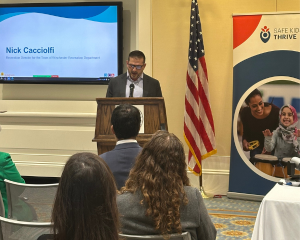Parenting stress, especially for young, first-time parents, is a driver of mental health challenges and depression. May is Mental Health Awareness Month and managing stress is a critical component of mental health for everyone, especially parents. Children learn from the behaviors of the adults around them, and the experience of those moments impact them long into their future. Extreme stress at home can cause feelings of anxiety and sometimes even trauma for children. Addressing parents’ mental health plays a key role in helping them raise children in safe, nurturing homes.
As the saying goes ‘you can’t pour from an empty cup,’ it is important for parents to take care of themselves in order to safely take care of their children.
The Children’s Trust Healthy Families program recognizes the impact of parenting stress and has integrated strategies into home visiting to help parents learn how to cope with and reduce parenting stress. A 2013 study of Healthy Families Massachusetts found that 38% of the mothers enrolled in the study exhibited clinically significant maternal depression and that mothers experiencing maternal depression were more likely to have a report of child abuse or neglect.
Home visitors are trained to identify mothers who are struggling with mental health, connect them with appropriate services, and support them in their parenting journey. Mothers who have received home visiting report better mental health than those who don’t receive similar services. An evaluation by Tufts University in 2017 found that mothers who had clinical depression when they entered the program exhibited reduced symptoms two years, and again five years, after beginning Healthy Families. The study also found that mothers had less substance use and fewer incidences of interpersonal violence, situations that can often exacerbate stress.
According to another study from Tufts University, mothers in Healthy Families Massachusetts reported a 36% decrease in parenting stress. The longitudinal evaluation also found that involvement in the program led to reducing homelessness and dependence on financial assistance and increasing employment and educational goals. These outcomes indicate that Healthy Families Massachusetts helps mothers learn and nurture the skills to achieve self-sufficiency and stability which in turn improve mental health and strengthen families.
Mothers who have received services also learn to become better advocates for their children, have more positive relationships with the fathers of their children, report decreased depression, and report better overall health than parents who are not in the program. Healthy Families Massachusetts increases well-being and empowerment for the parents enrolled in the program.
Mental Health Awareness Month might be recognized in May, but it is a vital component of our work with families all year long.
Learn more about our Healthy Families program and the incredible families working hard every day to build stable, nurturing homes for their children.


























